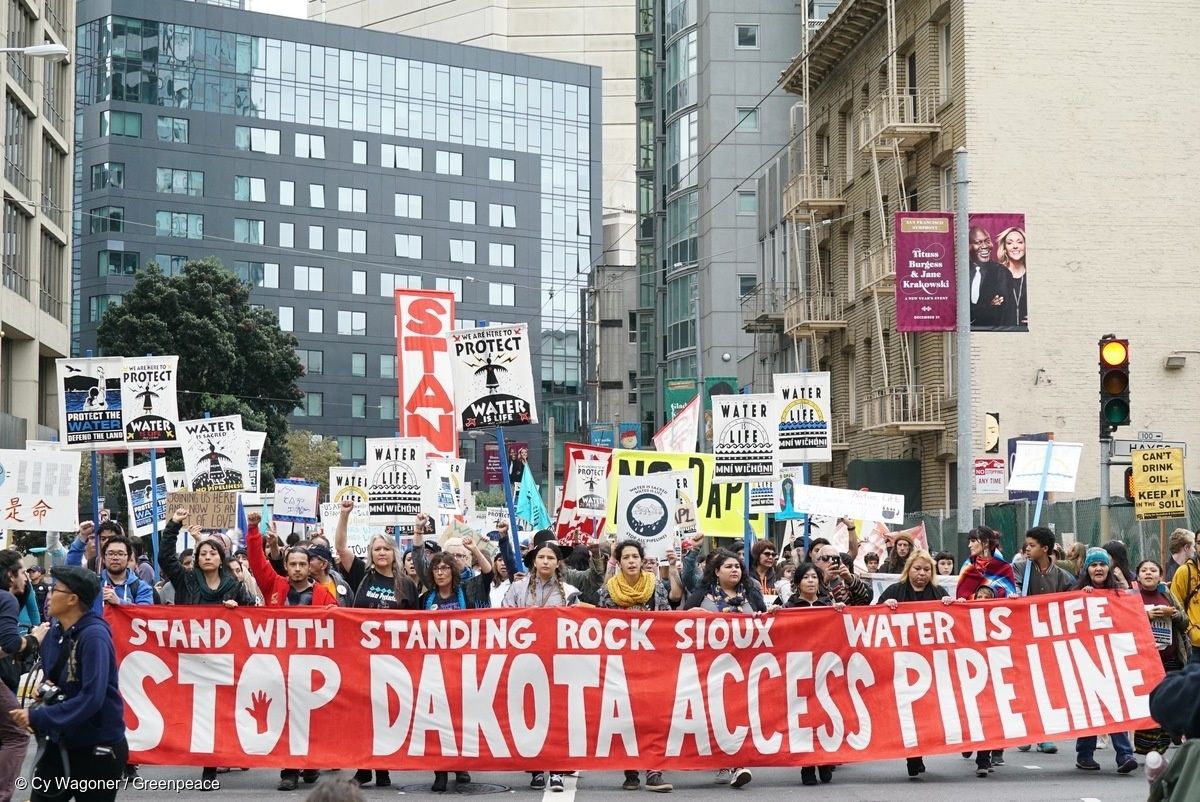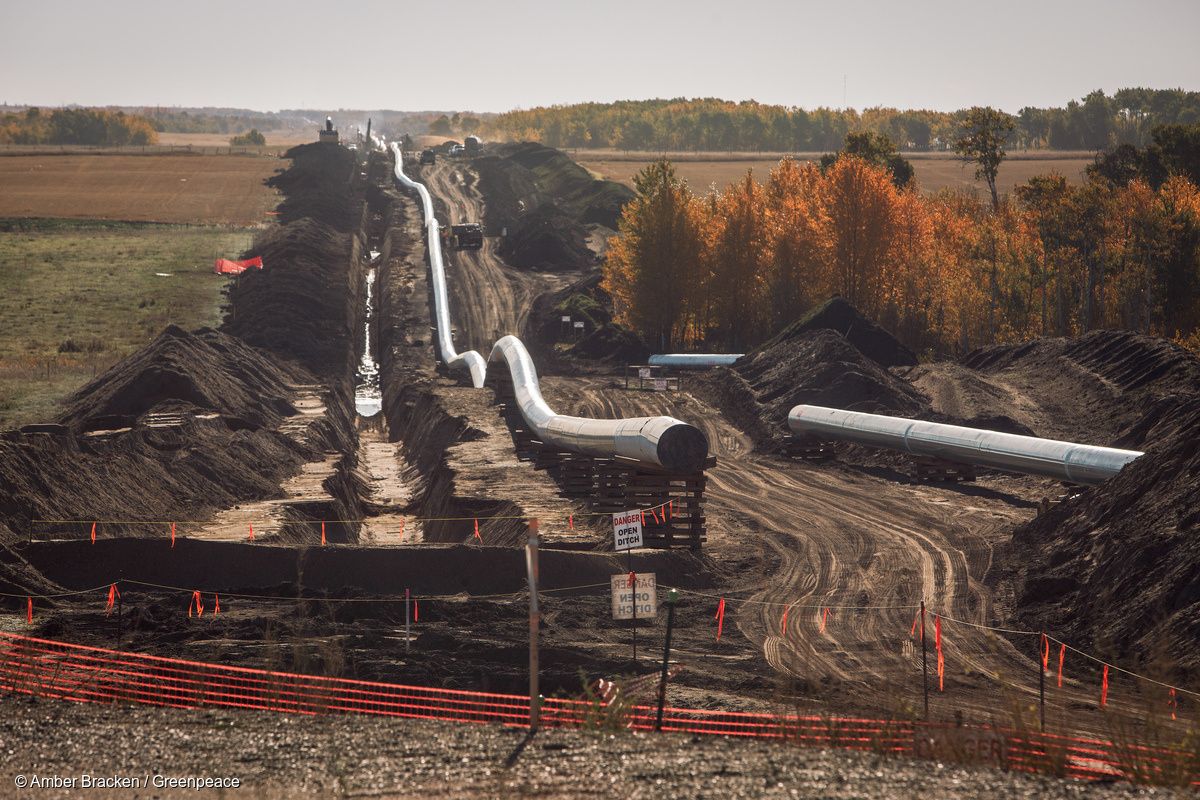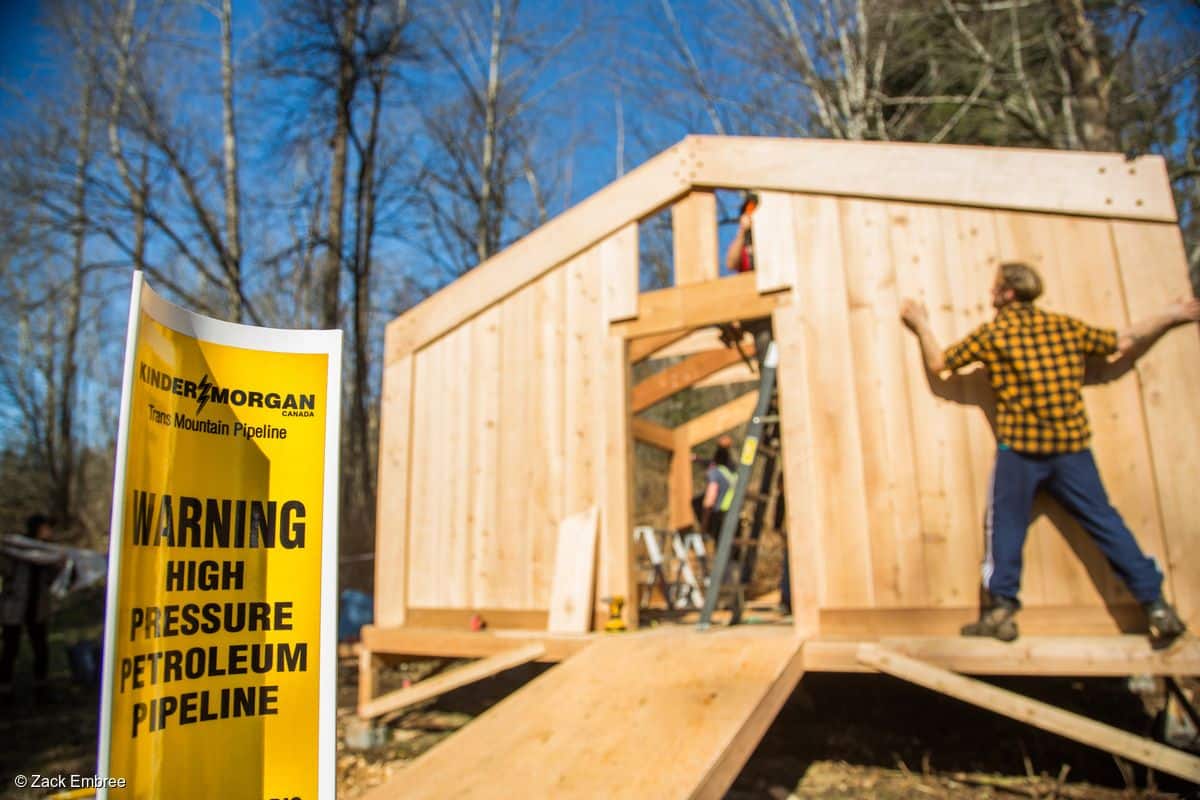
Dirty Pipelines Are Bad Investments and a Reputational Risk for Banks

More than 400,000 people demanded Credit Suisse stop financing in environmentally harmful projects like pipelines and tar sands. Greenpeace
By Leola Abraham
Growing Resistance
The banking industry should stop funding extreme fossil fuel pipeline projects that impact the climate and violate human rights. These projects are risky for banks as they face mounting pressure from a growing resistance movement and increased reputational risk in a world that is recognizing the urgent need to rapidly tackle climate change to avoid climate catastrophe.
Recently, more than 400,000 people, from 138 countries, signed a global petition demanding banks and financial institutions immediately end financial relationships with tar sands pipelines projects and other controversial pipeline companies such as Energy Transfer, the company that built the Dakota Access pipeline.
The Indigenous-led movement at Standing Rock against the Dakota Access pipeline further galvanized and helped grow a global movement against dirty oil pipeline companies. However, it saw the industry lash out in a variety of ways, including Energy Transfer’s baseless $900m SLAPP (Strategic Lawsuit Against Public Participation) against Greenpeace entities and others falsely accusing the groups of orchestrating the resistance at Standing Rock.
People march in support of the Standing Rock Nation at the Civic Center Plaza of San Francisco. The protest was one of many in a global day of action against the Dakota Access Pipeline calling on the U.S. Army Corps of Engineers to cancel the permit for the project.
Cy Wagoner / Greenpeace
Growing Reputational and Investment Risk
Despite the threats of bogus lawsuits and concerning corporate behavior by pipeline companies, many Indigenous Peoples, communities, and allies in the U.S. and Canada remain opposed to the dirty pipelines.
In North America, two out of the five proposed new tar sands pipelines—TransCanada’s Energy East and Enbridge’s Northern Gateway—were canceled after facing Indigenous and environmental legal challenges, widespread public opposition and changing economics.
In some cases the dirty pipelines cut across unceded Indigenous lands and threaten Indigenous rights by putting drinking water and precious ecosystems at risk of oil spills. Knowing there is no safe way to transport oil, no community wants the risk of an oil spill. When a spill inevitably happens, the impacts on the community and the environment are immense and oftentimes irreversible.
Even with this information, new tar sands pipelines are proposed and facing opposition. In Minnesota, Enbridge’s Line 3 pipeline is opposed by a coalition including tribal governments and landowners.
Enbridge’s Line 3 expansion under construction near Hardisty, Alberta.
Amber Bracken / Greenpeace
Even the Minnesota Department of Commerce has communicated concerns with the project. Also, recently a group of 13 young people, known as the Youth Climate Intervenors announced they planned to take the Minnesota Public Utilities Commission to court over the approval of Enbridge’s Line 3 tar sands pipeline.
In Nebraska, Indigenous leaders from across the U.S. and Canada signed a formal declaration against TransCanada’s Keystone XL pipeline and tar sands expansion in general.
In British Columbia, the Secwepemc Nation built solar-powered tiny houses to be placed in the path of Kinder Morgan’s planned new Trans Mountain Expansion Project and Tsleil-Wautuh Water Protectors built a traditional Coast Salish “Watch House” near the pipeline route, which played a central role in organizing resistance to the project.
Thousands gather in Metro Vancouver, British Columbia, for Indigenous-led “Protect the Inlet” mass mobilization against the Kinder Morgan Trans Mountain Expansion pipeline. Here a “Watch House” is being built near the pipeline route.
Zack Embree
In Vancouver, an Indigenous-led protest saw more than 10,000 people peacefully march demanding a stop to Kinder Morgan’s pipeline. What followed was months of resistance including more than 200 people arrested and protests in Quebec and across Canada, as well as in Seattle, the UK, Switzerland, Spain, Australia, Fiji and around the globe.
Ultimately, Kinder Morgan deemed the project too great a financial and reputational risk and, in May, sold the Trans Mountain pipeline and the infrastructure for the Expansion Project to Justin Trudeau’s Canadian government for CAN $4.5 billion. The move was a clear sign that dirty pipelines are risky investments for the companies, the banks and everyone involved.
[facebook https://www.facebook.com/KOMONews/videos/1835724843162506/ expand=1]
Growing Line of Investors to Shun Tar Sands
Trudeau’s decision to purchase the pipeline also came after the Royal Bank of Scotland, a large global bank, and BNP Paribas and HSBC, Europe’s two biggest banks, announced scale backs on financing tar sands projects.
Since then, other financial institutions such as the international financial services company, NN Group in the Netherlands, announced its withdrawal from tar sands oil and associated pipeline companies in Canada and the U.S. citing human rights concerns, pollution, and greenhouse gas emissions as the main reasons for its departure.
NN Group’s announcement came on the heels of the IPCC report where the world’s leading scientists sounded the alarm, sending a timely message to world leaders that they must get serious and cut emissions from fossil fuels by half in the next 10 years if we are to avoid climate catastrophe.
Banks and financial institutions should wake up and face their role in the looming climate disaster. They must act on their commitments to the Paris agreement—by reviewing their policies and funding patterns and aligning their businesses with a world that limits climate change to 1.5 degrees Celsius, protects the environment, and respects human rights.
As the global petition is delivered to banks, the people-powered resistance movement to stop dirty pipelines will continue because our future depends on it. #StopPipelines
Leola Abraham is a senior communications practitioner at Greenpeace USA, based in Washington, DC.
Correction: The language in the main caption was updated for clarity. “More than 400,000 people demanded Credit Suisse stop financing,” not “stop investing.”

 233k
233k  41k
41k  Subscribe
Subscribe 


